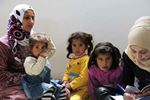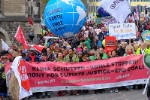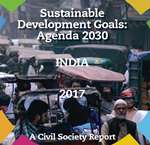Social Watch news
Published on Wed, 2017-12-13 16:39
A non-binding declaration on Women and Trade signed by 118 countries was made public today during a press conference at the Hilton Hotel, where the 11th Ministerial Conference of the World Trade Organization (WTO) is taking place.
The “Joint Declaration on Trade and Women's Economic Empowerment” states without offering evidence that “international trade and investment are engines of economic growth for both developing and developed countries, and that improving women's access to opportunities and removing barriers to their participation in national and international economies contributes to sustainable economic development”.
|
Published on Tue, 2017-12-12 00:00
The statement by women’s rights groups that calls out the WTO Declaration on Women’s Economic Empowerment which it says “appears to be designed to mask the failures of the WTO and its role in deepening inequality and exploitation”.
|
Published on Mon, 2017-12-11 10:51
In India, PPPs are expected to mobilize about half of the US$ 1 trillion target for infrastructure investment by the end of the 2012-2017 Five Year Plan. The government has been actively promoting PPPs in many sectors of the economy and the report by Social Watch India presents a mixed picture. Many of the highway/road construction projects like Golden Quadrilateral and seaports like the Jawaharlal Nehru Port Trust (JNPT) have been deemed a success.
The report observes, however, that “many times PPPs are good in theory, but in practice… they have transmogrified into avenues for the realtors to become rich at the cost of the tax payers”. Some promoters who excelled at gold-plating projects 'persuaded' public sector banks to lend on questionable assumptions and collateral. These promoters took out their equity money in the construction phase and exited the project under various conditions. Given India's rank in 'enforcing contracts' of 178 out of 189 countries, this should cause little surprise, since PPPs are essentially contracts. The biggest losers have been Indian citizens. Public sector banks now have a pile of stressed loans, which can now be remedied only by recapitalization from the tax payer.
|
Published on Fri, 2017-12-08 17:20
The international workshop 'Strengthening Public Policies for the 2030 Agenda and the Launch of the Spotlight Report 2017: Reclaiming Policies for the Public' was held in Beirut, Lebanon.
This session looked into the role of different actors in the implementation of the 2030 Agenda: states, private sector and civil society. The panel discussion particularly discussed the roles for Civil Society Organizations (CSOs) in localizing the Sustainable Development Goals in regional and national contexts. Among the issues that were discussed is how CSOs can bring the voice of the poorest and most marginalized citizens to the national, regional and international fora. In addition, the session touched upon the CSOs contributions to implementation, including as service delivery agents and the accountability of CSOs and their role in making the other actors accountable.
|
Published on Tue, 2017-11-28 16:13
“Data is the new Gold” headlined a 2014 article in the business press on the marketing power it offers. “Each click, like, and share creates new data in the world, much of which can be used to deliver relevant marketing information and bring increased value to consumer audiences.” Picking up on the potential of so-called Big Data to measure national and global progress on development goals agreed in the 2030 Agenda for Sustainable Development, the 2030 Agenda has driven a variety of new initiatives, bringing together a vast array of global corporations, foundations, and CSOs ready to mine this new seam.
Three of these new data initiatives are the Global Partnership for Sustainable Development Data (GPSDD), Data 2X and the Digital Impact Alliance, all of which are housed at the United Nations Foundation (UNF) and which therefore claim only to advance UN goals and priorities, not the UN itself. Most of them are financed by a few major donors, public and private.
|
Published on Mon, 2017-11-27 13:03

Photo: UNHCR/F.Juez
|
Achieving sustainable development in Lebanon requires addressing the root causes of Lebanon’s structural problems at political, economic and social levels and, additionally, to address the challenges presented by the huge influx of Syrian refugees in the country. The refugee crisis sheds light on the structural and systemic problems of Lebanon and aggravates them. In this context, the private sector, as in many other countries, must play an active role in achieving SDGs in Lebanon, along with other development actors. At the same time, they all should remain accountable for their contribution to sustainable development.
|
Published on Wed, 2017-11-15 09:40

Photo: Wolfgang Obenland
|
How can we ensure that implementation of the Paris Agreement truly helps foster more just and sustainable development, and what is standing in the way of this progress?
It is no secret that a dual relationship exists between climate change and sustainable development. While climate change influences the environment and has deep impacts on human living conditions and therefore affects the cornerstones of social, economic and environmental development, the way society chooses to develop has implications on greenhouse gas emissions.
|
Published on Fri, 2017-11-10 16:59

Photo: Creative Commons
License/Manuel
|
Water is a key concern in Mexico, where 100 civil society organizations submitted a joint report to the UN documenting how “privatization policies benefit extractive industries and mega-projects instead of reducing inequalities in access to essential services”. Users with difficulties in paying the increased tariffs are being denied their human right to water and the quality of the water distributed has deteriorated so much in many places that in Aguascalientes 95 percent of the water people drink is bottled.
The report points out that water issues affect women disproportionately. “When there is a shortage, irregular delivery or bad quality water, women spend more time to bring water to their homes, boil it, filter it and deal with the authorities, frequently adding up to 30 hours a week to their domestic work.” The Mexico Social Watch report emphasizes that “insufficient and ineffective regulations on environmental and social impact, have led to numerous cases of violation of fundamental rights due to business activities”.
|
Published on Fri, 2017-11-10 16:55
In Egypt the World Bank argues that the gains in mortality rates and life expectancy levels achieved since the beginning of the last century will not continue if the private sector is not involved, due to the government's failure to devote more resources to the health sector and a lower possibility of improving unhealthy daily habits of poor people.
The Social Watch report notes that while the government has announced the creation of PPPs in the Smouha Maternity University Hospital and Blood Bank and Al Mowasat Hospital, the PPP central unit has not made public the details of the projects, nor the nature of the investors’ responsibilities. Nor has it announced the main investors in the projects or the improvements that they are expected to achieve. All that is known by civil society is that the PPPs will be implemented and partially managed by Bareeq Capital, DETAC Construction & Trading, Siemens Healthineers and G4S Company.
|
Published on Fri, 2017-11-10 13:09
The informal economy comprises half to three-quarters of all non-agricultural employment in the developing countries, Roberto Bissio, coordinator of the Social Watch international secretariat in an article on "Past and future of informal workers" published by the Arab NGO Network for Development as part of its report on informality in the Arab region.
The study combats the notion that informality in developing countries is associated with "traditional" or "backward" sectors in the economy, and exposes as contributors to present-day informality the pressure to reduce the state and its control by international financial institutions like the World Bank, the benefits obtained by multinational corporations from cheaper labour and flexibility in workers' contracts and the "uberification" of the economy through online outsourcing of small pieces of work.
|
SUSCRIBE TO OUR NEWSLETTER
Submit

|











